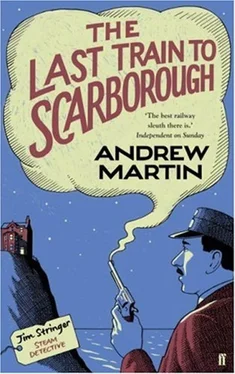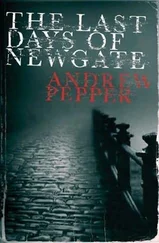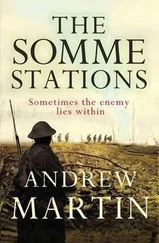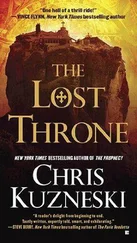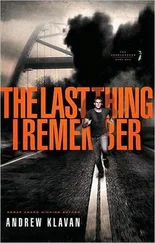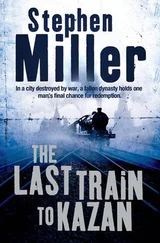'Let's watch,' said Sylvia, as though what I'd just said wasn't really true, and needed to be proved.
We watched, and when he'd done, Shannon circled on his bike in the pool of white light that he'd made, and set off back for Thorpe and, if I knew him, the Fortune of War public house.
'I love Mr Shannon,' said Sylvia as he wobbled off between the wide, darkening fields.
'He's quite useful about the village,' I said.
'That's exactly what I mean,' said Sylvia.
'He hasn't changed the water in the horse trough for a while,' said Harry. 'It's all green.'
'How does he take the old water out?' asked Sylvia.
'Harry?' I said, turning to the boy. 'How does he do it?'
Harry watched the gas lamp for a while, keeping silence.
'Not sure,' he said, after a while.
'Perhaps he drinks it,' said Sylvia, and she gave a quick little smile.
'That might not be far off the mark,' I said, thinking of Shannon sinking his nightly five pints of Smith's.
We turned and walked back to the house, across our land, which we called 'the meadow'. It smelt of cut grass just then because I'd gone at some of the taller stuff with a scythe in my work suit only an hour before. The house was a long cottage, half tumbled-down, but it was big, getting on for three times the size of our old place on the main street of Thorpe. You could look at it as a terrace of three with a barn or, with a bit of knocking-through, it would be one good-sized cottage with built-on barn.
We lived in four rooms at one end of it, but the whole thing was ours, and on the day we'd moved in the wife had turned to me in our new parlour and said, 'Well, Jim, we've got on!
She was before the house now, beating a Turkey carpet that hung from the washing line. I had never seen that carpet before, but the house had come furnished, and the wife was turning new things up every day.
'I still can't believe it's our house,' said Sylvia as we came up.
'Well, you can thank Mr Robert Henderson for that,' I said.
'He must really like us,' said Sylvia.
'He really likes mother,' said Harry, and I eyed him as we stopped to watch the beating of the rug.
It was true enough.
I watched the wife beating away. With each stroke, a wisp of her brown hair flew forwards, and she pushed it back behind her left ear. But her left ear was too small to keep it in place. You'd think she'd have worked that out after thirty years. As she went at it, the colour rose in her face – not to redness, but a dark brown. I had often wondered whether there might have been a touch of the tar brush in the wife's family, to account for the blackness of her eyes, and the brownness that went all the way down. I thought of Harry's paper, The Captain, which he had on subscription every week, and how one of the stories was 'Tales of the Far West'. There were Sioux Indians in these tales and at odd times a Sioux squaw would appear, supposedly a different one every time. But all of them looked like Lydia.
'Feel free to just stand there gawping,' she said. 'Harry, you'll take the water up for your sister's wash.'
Harry went off to the copper in the scullery. He was good about helping around the house. His main job was to look out for his sister. Their bedrooms were both at the end of a long corridor, over the top of the in-built barn, and this made Sylvia nervous, even though it was these two rooms that had decided us – or decided the wife – to rent the house from Henderson at the knockdown rate of seven shillings a week. It was the view over the fields that had done it. There was a gas mantle in the corridor between the two rooms, and Sylvia believed that it was kept on all night. But this was because she had never yet been awake beyond eight o'clock. In fact, Harry was under orders to come out of his room and switch it off at nine, after his hour of reading, which was often more than an hour.
The children went off through the opened front door, and I said to the wife, 'I'm not sure you should be beating that carpet with washing still on the line.'
I said that just to see the look she would give me, but she didn't take the bait. Instead, still beating, she said, 'Mr Buckingham has been riding the railway again.'
'Oh Christ,' I said.
'On his departure from the station -'
'Which station?'
'Any station… He found that the carriage door had been left unfastened by the company's servants…'
'Which company?'
'You won't put me off… Mr Buckingham endeavoured to fasten the door himself, and…'
Mr Buckingham didn't exist but I could picture him quite easily. He had pop eyes, a red face, and a thin moustache; he looked permanently put-out and was always ready to fly into rage. He was smartly dressed, in clothes often dirtied by the negligence of whatever railway company had the ill-luck to carry him, according to terms and conditions that might or might not have been correctly set out or somehow indicated on the backs of their tickets. He carried a portmanteau (containing valuable items) which was regularly mislaid or damaged by the company's servants. Everything he did was reasonable, or reasonably foreseeable, or so he said, and everything the company did was unreasonable, or so he also said.
'In endeavouring to fasten the door,' said the wife, who had now left off beating the carpet and was enveloping herself in linen as she took down the laundry, 'Mr Buckingham injured himself -'
'Seriously, I hope.'
'And he is contemplating suing. What are his prospects of success?'
The wife said that last part with two clothes pegs in her mouth, and she now walked to the laundry basket, which was over by the chicken run.
'This is something to do with Adams versus the Lancashire and Yorkshire Railway Company, isn't it?' I said.
'It might be,' the wife said, as she dropped the white sheets into the basket. Some of them went in, and some went onto the bit of cinder track that skirted the chicken run.
'Oh heck,' said the wife.
She was no great hand at housework, but she knew more about An Introduction to Railway Law by Harold Andrews – in which the adventures of Mr Buckingham featured – than I did myself, which was a bad look-out, since I was the one about to be tested. She picked up a tea towel that had missed its mark, and tried to brush off the muck.
'I'd say that was reasonably foreseeable,' I said.
'I forgot to mention', said the wife, standing upright again, and turning to me, 'that Mr Buckingham attempted to close the door while the train was in motion, and that there was a sign fixed to the door expressly forbidding opening or closing it while the train is moving.'
'Right,' I said.
'… which Mr Buckingham didn't see.'
'Had he been drinking, by any chance?' The wife glanced anxiously down again at the basket, looked up at me, and brushed her hair behind her ear.
'Come on, Jim,' she said. 'You're supposed to know this.' And her hair fell forward.
Now York retreated at a great rate, and I was back in the coal cellar, which was now rising bodily at speed. I was not rising in it, for the floorboards remained the same distance from my face. I would be sick at the peak of the rise, I knew; but when the peak was reached and the next fall began, I changed my idea: I will be sick at the lowest point of the fall, I decided, but instead I turned my head, finding once again a kind of coolness on the coals, and an easing of the pain in my head as York came back.
There came first scenes of the kind I'd once seen at the Electric Theatre with the wife: the great cathedral, the gates of the city wall, only the pictures were not moving, just as they had not moved at the Electric Theatre, except for scenes of the river Ouse – or some such moderately wide and dirty river – meant to suggest the passing of time. That had not been enough for the wife, who had leant across to me, and said, 'Two shillings for this, it's a swiz.' But the scenes showed that York was an important place. Important and beautiful, and I ought not to have left it for Scarborough.
Читать дальше
